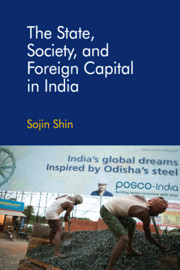Book contents
- Frontmatter
- Dedication
- Contents
- List of Tables, Figures, Illustrations, and Maps
- Acknowledgements
- 1 Introduction
- 2 FDI Inflows in India: Ideas, Interests, and Institutional Change
- 3 FDI Inflows in Tamil Nadu: Inclusionary Ideas, Weakened Interests, and Incremental Institutional Change
- 4 Making FDI Work in Tamil Nadu
- 5 FDI Inflows in Odisha: Weakened Ideas, Strong Interests, and Unstable Institutional Change
- 6 Making FDI Work in Odisha?
- 7 Conclusion
- Bibliography
- Index
4 - Making FDI Work in Tamil Nadu
Published online by Cambridge University Press: 08 July 2018
- Frontmatter
- Dedication
- Contents
- List of Tables, Figures, Illustrations, and Maps
- Acknowledgements
- 1 Introduction
- 2 FDI Inflows in India: Ideas, Interests, and Institutional Change
- 3 FDI Inflows in Tamil Nadu: Inclusionary Ideas, Weakened Interests, and Incremental Institutional Change
- 4 Making FDI Work in Tamil Nadu
- 5 FDI Inflows in Odisha: Weakened Ideas, Strong Interests, and Unstable Institutional Change
- 6 Making FDI Work in Odisha?
- 7 Conclusion
- Bibliography
- Index
Summary
The village in India … has in recent decades seen profound changes. The twin shackles that once decided matters for India's villagers, caste and agriculture, no longer exercise their vigorous hold. While a break in caste rigidities has fostered greater fluidity in occupational choices, agricultural stagnation has ensured the constant march, in increasing numbers, of employable people in the villages towards urban areas.
This chapter presents how the state and society of Tamil Nadu encourage FDI projects at the local village level. Data collected from two locations in the field where Hyundai Motor India (HMI hereafter) and Michelin India (MI hereafter) embarked on FDI projects strongly support the argument underlined in the previous chapter – the inclusionary nature of state–society relations has helped Tamil Nadu make FDI inflows work. The state of Tamil Nadu has provided inclusionary schemes like substantial compensation to citizens who lose their livelihood in the process of FDI inflows. As discussed in detail in the previous chapter, the ideas of social inclusion have been pursued for the broader strata of citizens through many different forms including land reforms and various rehabilitation packages. Land reforms, in particular, have been considerably helpful for the state agencies to acquire lands for an industrial purpose.
On the basis of the case study of two FDI projects carried out in the manufacturing sector in two different districts of Tamil Nadu, this chapter aims to understand the close relationship between the state, society, and foreign capital that are involved in the process of FDI inflows in Tamil Nadu. The two cases examined are HMI in the district of Kanchipuram and MI in the district of Thiruvallur (Map 4.1).
Data were collected during a four-month stay in Chennai and Delhi from December 2011 to March 2012 and a short revisit to the cities in August 2013. Intensive interviews were conducted with different groups of people including political leaders, bureaucrats, social activists, villagers, Indian domestic industrialists, and foreign investors through several visits to the two manufacturing factories of HMI and the construction site of MI. On the basis of fieldwork findings, I suggest that the process of FDI inflows in the state of Tamil Nadu has been tacitly but aggressively pursued by a tripartite alliance between the state, bureaucrats, and foreign capital.
- Type
- Chapter
- Information
- The State, Society, and Foreign Capital in India , pp. 79 - 105Publisher: Cambridge University PressPrint publication year: 2018



